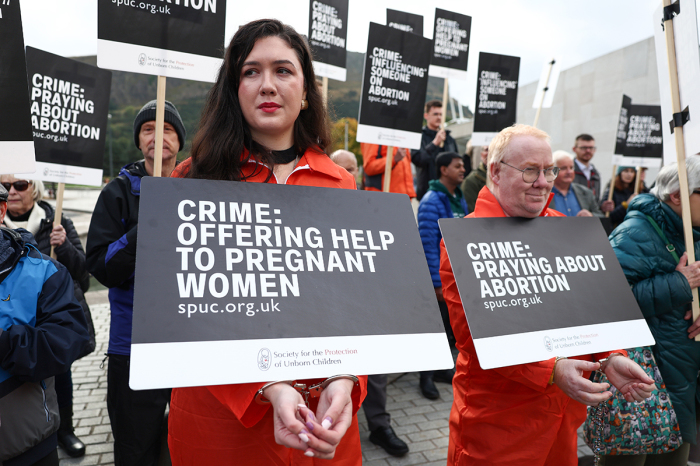'Tragic day': Law banning pro-lifers from abortion clinics could make silent prayer illegal

Buffer zones around abortion facilities went into effect in England and Wales, a development that pro-life advocates contend criminalizes silent prayer and offering help for women and families in need of pregnancy resources.
The zones, which were approved last year after Parliament passed the Public Order Act 2023, went into effect last Thursday. Under the law, it is a criminal offense for someone to be within 500 feet (150 meters) of an abortion facility or the access point of a building that has an abortion facility located inside.
Section 9 of the Public Order Act 2023 states that “influencing” abortion-minded women or people performing abortions is now illegal. The law also prohibits actions that constitute “causing harassment, alarm, or distress” to abortion workers or someone entering an abortion facility.
One of the largest providers of abortion and contraception worldwide, Marie Stopes Reproductive Choices, formerly Marie Stopes International, celebrated the implementation of the buffer zones, also known as "safe access zones" in England and Wales.
“This is a huge win for reproductive rights at MSI Reproductive Choices UK, and we hope that this show of support from the government will inspire positive change elsewhere in the world, where our clinics remain unprotected from anti-choice harassment,” the group said in a statement last Thursday.
“Everyone deserves to access and provide abortion [...] without fear of anti-choice harassment,” the statement continued. “Now, in England and Wales, this will be the reality. And everywhere else, we'll keep fighting.”
Right to Life UK spokesperson Catherine Robinson, however, bemoaned the introduction of buffer zones. She called it a “tragic day” for pregnant women in need of support and their unborn children in a statement released Thursday. The pro-life group argued that current laws already protect women and the general public from harassment outside abortion facilities.
“Hundreds of women have received practical support from pro-life volunteers outside abortion clinics over the years, support that provided a real alternative to abortion,” Robinson added.
Right to Life UK highlighted the Be Here for Me campaign, which consists of mothers in the United Kingdom who oppose buffer zones. The campaign features testimonies from women who received help from pro-life volunteers stationed outside abortion facilities, including financial support and material resources.
“The introduction of buffer zones today will criminalize offers of support outside abortion clinics,” she continued. “This support not only gives women a genuine choice but also helps those who may be facing coercion. Without this, many women will go through with abortions they didn’t want and the lives of many more babies will be tragically lost to abortion.”
On the day that the new law was rolled out, the Crown Prosecution Service also released new guidelines that Right to Life UK fears could create “confusion” about what activities outside abortion facilities are considered illegal.
While threats, assault and verbal abuse are illegal under the Act, the guidelines also list silent prayer, singing around religious pictures, holding vigils and passing out leaflets with what it described as “misinformation” about abortion.
CPS did acknowledge, however, that “factual questions” may arise, noting that “a person who carries out any of these activities within a safe access zone will not necessarily commit a criminal offense.” The public agency instructed prosecutors to consider the context of certain actions, as well as the “facts and circumstances.”
Earlier this month, British military veteran Adam Smith-Connor was found guilty of praying silently near an abortion facility in England. The Pool Magistrates Court granted Smith-Connor a conditional discharge, which means the veteran will face sentencing if convicted of future offenses within the next two years.
“Today, the court has decided that certain thoughts — silent thoughts — can be illegal in the United Kingdom,” Smith-Connor said after the ruling. “That cannot be right. All I did was pray to God, in the privacy of my own mind, and yet I stand convicted as a criminal?”
Following the implementation of abortion buffer zones, Students for Life of America and Students for Life Action President Kristan Hawkins expressed concern about the United States enacting a similar law.
"If you think America could never follow suit, you are mistaken, as this could easily be us under a Kamala Harris administration," the pro-life leader wrote on X on Thursday.
Listing her concerns with the vice president’s record, Hawkins pointed to Harris' answer during an interview with NBC’s Hallie Jackson about whether the presidential hopeful would consider “religious exemptions” to a nationwide abortion mandate. Harris responded, “I don’t think we should be making concessions.”
“Pro-lifers are not safe under a Harris-Walz administration,” the SFLA president declared. “If you are pro-lifer and decided to sit out this election, please reconsider & vote like your freedoms & lives depend on it — because they do.”
Samantha Kamman is a reporter for The Christian Post. She can be reached at: samantha.kamman@christianpost.com. Follow her on Twitter: @Samantha_Kamman





























